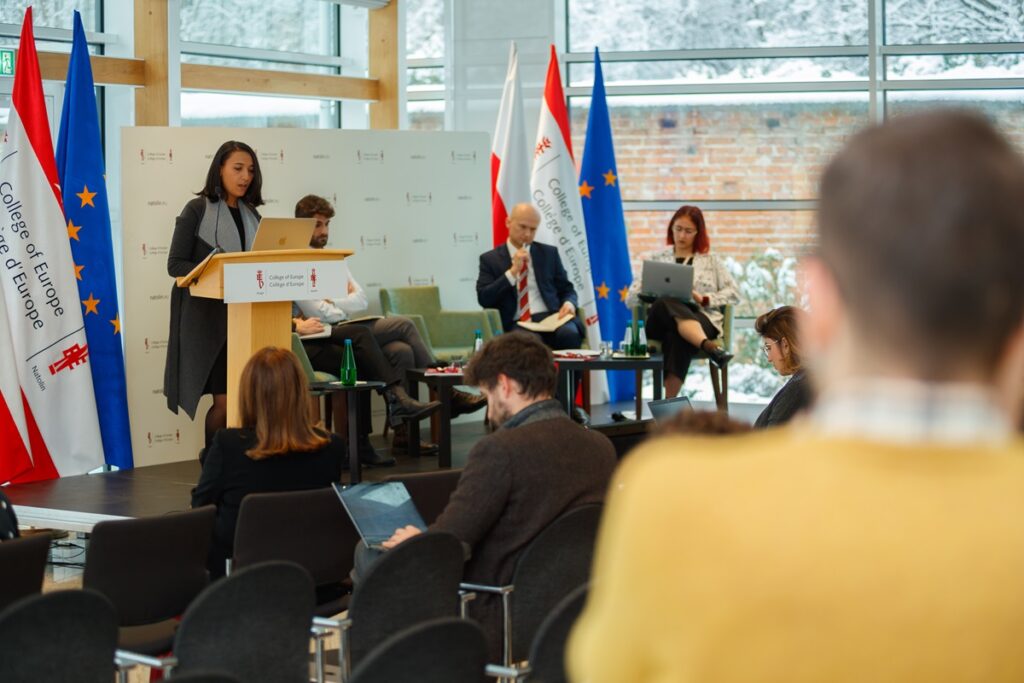The Mediterranean Sea is the deadliest sea on earth. Even though it is surrounded by the shores of a Europe which aims to promote human rights, or perhaps because of that, thousands of migrants disappear every year while attempting to cross the water on makeshift boats. The conference : “The Rough Sea : Mediterranean routes of migration to the European Union” held at the College of Europe in Natolin the 18th November 2023, reunited scholars and politicians to shed light on this issue: why would those people face such a risk? What are the root causes of this migration through the Mediterranean Sea? While the causes of migration may seem obvious, they are much more difficult to establish than one might anticipate; and the success in doing so has far-reaching consequences.
There are many causes for migration to Europe via the Mediterranean Sea. Scholars often divide these incentives into pull and push factors. In this way, the factors are sorted, respectively, concerning the receiving countries and the origin countries of the migrants. As noted by Liska Wittenberg in her report for the International Peace Institute, Managing Mixed Migration: The Central Mediterranean Route to Europe, “migrants and refugees are often ‘pulled’ toward Europe to pursue increased opportunities for long-term employment, to reunite with their family, or to gain improved access to education.” The domestic policies of receiving countries which aim to attract immigrant workforce for sectors experiencing labor shortages also function as pull factors. The push factors, on the other hand, are described as those “pushing” migrants out of their home countries. These factors are numerous, including: “armed conflicts and situations of generalized violence, fear of political or religious persecution, political instability, human rights violations, chronic poverty, lack of economic opportunity, and natural or humanmade disasters.”
These factors help explain why migrants make the decision to leave their countries and cross the Mediterranean Sea, and seem to correspond with each other. Migrants flee and seek political stability, high-level education, better life conditions, economic opportunities and an existence free from climate-induced catastrophes.
Yet, in reality, the reasons for migration are very difficult to assess. First, data on migration, and specifically on irregular migration, is difficult to collect. Second, since it may be a combination of many factors which are often intertwined. Therefore, determining which precise factor is a cause for migration is nearly impossible. For example, a push factor increasingly studied is related to climate change – people are expected to move and migrate to flee climate induced disasters such as floods and droughts. Surprisingly, according to Elenora Milazzo, only five percent of migrants in Africa say they migrate for environmental reasons. Yet when asked, half of them declare that it did play a role in their decision. Factors tend to overlap and thus, the causes for migration are more complex than the migration-related vocabulary may suggest. For example, the distinction between migrants and economic migrants seems to categorize migrants based on the causes of their migration. This distinction gives the illusion that the causes of migration are clear, separate, and easily identified. However, this is clearly not the case. Therefore, determining the incentives for migration seems like a tricky task.

Nevertheless, if causes to overall migration seem to be complex and intertwined, an assumption can be made concerning why they do so through the deadly Mediterranean route. As Lorenzo Piccoli assured, migration via the Mediterranean route might be explained by the fact that the opportunities for legal migration to Europe are extremely restrained. “Limited options for regular movement have left both refugees and migrants with little choice but to undertake risky, clandestine journeys” notes Liska Wittenber, in her report for the Peace institute. The very restricted number of visas granted explains this precarious migration trough the Mediterranean Sea, as Lorenzo Piccoli asserts. This explanation seems to completely debunk the “myth of invasion” – a narrative becoming increasingly popular in Europe. It is indeed precisely based on the narrative focusing on the push factors. This myth implies that “African misery” is pouring human crowds onto European shores. The assumption “that war and poverty are the root causes of mass migration across and from Africa” therefore fuels the myth of invasion. As Hein De Haas writes in his article for the Third World Quarterly, “Myth of Invasion: The Inconvenient Realities of African Migration to Europe”: “Popular images of extreme poverty, starvation, tribal warfare and environmental degradation amalgamate into a stereotypical image of African misery as the assumed causes of a swelling tide of northbound African migrants.” The myth of invasion seems to spread flawed conceptions of migration, in addition to being based on incorrect ones. Indeed, “Although commonly portrayed as destitute or desperate, migrants are often relatively well educated and come from reasonably well-off backgrounds, not least because of the relatively high costs of the journey. Although migrants are commonly depicted as victims of unscrupulous traffickers and smugglers, empirical evidence has indicated that the vast majority migrate on their own initiative,” De Haas concludes.
Elaborating the causes of migration seems like a complex, but also highly important task. The establishment of those causes, or of those alleged causes, determine the vocabulary, public opinion, as well as public policies on migration. According to Haas, it is this flawed vision on the causes of migration which renders many immigration policies inefficient. As argued above, causes are difficult to establish and often overlap. Nonetheless, an often-overlooked cause to migration is the difficulties to access legal documents for migrants. Those misconceptions on migration may have long lasting consequences, as they influence migration policies. Flawed assumptions on root causes to migration result in inefficient policies. Therefore, it seems imperative to consider migrants’ access to legal documents to better understand, and also prevent, the rough sea to become even deadlier.

